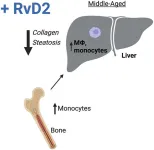(Press-News.org) Research led by Queen Mary University of London’s Wolfson Institute of Population Health has found that hormone levels, measured through blood tests, are an important indicator of whether women will benefit from recently licensed medication for the prevention of breast cancer.
Aromatase inhibitors such as anastrozole are recommended by the National Institute of Clinical Care and Excellence (NICE) as an option for preventive therapy in post-menopausal women at high risk of breast cancer. Anastrozole (Arimidex) is now also licensed by the Medicines and Healthcare products Regulatory Agency (MHRA) for breast cancer prevention. The study, published today (6 December) in Lancet Oncology, could lead to better ways to identify those post-menopausal women who would most benefit from these drugs.
1 in 7 women in the UK will develop breast cancer, with almost 56,000 cases diagnosed every year. Post-menopausal women who have higher concentrations of the hormone oestrogen in their blood stream are at higher risk of developing breast cancer. Aromatase inhibitors stop the production of oestrogen and reduce the amount made in the body. They are currently the most effective preventive agent for oestrogen-receptor positive breast cancer, but their utility could be increased by identifying those who stand to benefit most by taking these drugs.
Led by Professor Jack Cuzick at Queen Mary University of London, an international team of authors from the UK, Australia, Finland, Germany, Italy, and the USA tested whether measuring oestrogen in the blood could identify which women at increased risk of breast cancer will benefit most from the preventive effects of an aromatase inhibitor. They analysed data from the IBIS-II prevention trial, an international randomised controlled trial of anastrozole in high-risk post-menopausal women conducted from 2003 to 2012.
In their analysis of a case-control study of 212 women (72 cases, 140 controls) there was a clear trend of increasing risk with increasing hormone levels in the placebo group, but not in the anastrozole group. A 55% reduction of risk of developing cancer was seen in three quarters of the women receiving anastrozole, but a much lower reduction was seen in those in the bottom 25% of oestradiol levels.
These data suggest that inexpensive blood tests to measure hormones could be used to identify women who will benefit most from preventive therapy with an aromatase inhibitor. This personalisation would allow for women to receive the medication that would offer them the best balance of managing cancer risk and side effects.
Professor Jack Cuzick said: “These results are very exciting, and can refine how we choose preventive medication for post-menopausal women at high risk of breast cancer. In our study the 25% of these women with the lowest oestradiol measurements benefitted little from taking anastrozole, while still suffering from the side effects of the drug. A simple blood hormone test could improve the benefit of anastrozole if we use it to select the patients best suited to take it. We now need to routinely assess hormone levels in post-menopausal women at high breast cancer risk before prescribing anastrozole, to identify those who are at greatest risk and will respond well.”
Dr David Crosby, head of prevention and early detection at Cancer Research UK, said: “It was really exciting when anastrozole was approved by NICE as a preventive treatment for some woman at high risk of breast cancer. This research now gives us some clues about which women would benefit most from the drug, while identifying women who won’t benefit and can be spared unnecessary side effects. Cancer Research UK carried out some of the key work on developing these drugs, known as ‘aromatase inhibitors’. It's an area with a lot of potential, and larger trials building on the results in this study will be key to further understanding who is most likely to benefit.”
Professor Cuzick is a world-leading researcher in the prevention and treatment of breast cancer, and is the author of more than 500 peer-reviewed papers. Amongst other important breakthroughs, his research led to the use of tamoxifen as a prophylactic treatment for women at risk of breast cancer, and he led the IBIS-II trial to examine the efficacy of the aromatase inhibitor, anastrozole, in the prevention of this disease. He is being presented with the William L. McGuire Memorial Lecture Award at the 2023 San Antonio Breast Cancer Symposium (SABCS).
ENDS
NOTES TO EDITORS
Contact:
Sophia Prout
Faculty Communications Manager – Medicine and Dentistry
Queen Mary University of London
Email: s.prout@qmul.ac.uk
Tel: +44 (0) 7718136512
Paper details:
Prof Jack Cuzick PhD (Wolfson Institute of Population Health, Queen Mary University of London), Kim Chu MSc (Wolfson Institute of Population Health, Queen Mary University of London), Prof Brian Keevil PhD (University South Manchester NHS Foundation Trust), Adam R Brentnall PhD (Wolfson Institute of Population Health, Queen Mary University of London), Prof Anthony Howell MD (Paterson Institute for Cancer Research, University of Manchester), Nicholas Zdenkowski PhD (Faculty of Health and Medicine, University of Newcastle), Prof Bernardo Bonanni MD (Division of Cancer Prevention and Genetics, IEO, European Institute of Oncology IRCCS, 20141 Milan, Italy), Prof Sibylle Loibl PhD (German Breast Group, Goethe University of Frankfurt), Prof Kaija Holli MD (Tampere University), Prof D. Gareth Evans MD (Centre for Genomic Medicine University of Manchester), Prof Steve Cummings MD (San Francisco Coordinating Center, California Pacific Medical Center Research Institute and Department of Epidemiology and Biostatistics, University of California, San Francisco), Prof Mitch Dowsett PhD (Institute of Cancer Research, Royal Marsden Hospital).
“Impact of baseline oestradiol and testosterone serum levels on the effectiveness of anastrozole in preventing breast cancer in high risk postmenopausal women - a case control study”
Lancet Oncology: Embargoed until 14.30 UK (08:30 CST) WEDNESDAY 6 DECEMBER 2023
DOI: 10.1016/S1470-2045(23)00578-8
Available after publication at: https://www.thelancet.com/journals/lanonc/article/PIIS1470-2045(23)00578-8/fulltext
Funding information
IBIS-II was funded by Cancer Research UK, and the National Health and Medical Research Council, Australia. Biobank and hormone assays in this study were funded by the Breast Cancer Research Foundation, and hormone assays funded by The Royal Marsden Cancer Charity.
About Queen Mary
www.qmul.ac.uk
At Queen Mary University of London, we believe that a diversity of ideas helps us achieve the previously unthinkable.
Throughout our history, we’ve fostered social justice and improved lives through academic excellence. And we continue to live and breathe this spirit today, not because it’s simply ‘the right thing to do’ but for what it helps us achieve and the intellectual brilliance it delivers.
Our reformer heritage informs our conviction that great ideas can and should come from anywhere. It’s an approach that has brought results across the globe, from the communities of east London to the favelas of Rio de Janeiro.
We continue to embrace diversity of thought and opinion in everything we do, in the belief that when views collide, disciplines interact, and perspectives intersect, truly original thought takes form.
About CRUK
Cancer Research UK is the world’s leading cancer charity dedicated to saving lives through research, influence and information.
Cancer Research UK’s pioneering work into the prevention, diagnosis and treatment of cancer has helped save millions of lives.
Cancer Research UK has been at the heart of the progress that has already seen survival in the UK double in the last 40 years.
Today, 2 in 4 people survive their cancer for at least 10 years. Cancer Research UK wants to accelerate progress and see 3 in 4 people surviving their cancer by 2034.
Cancer Research UK supports research into the prevention and treatment of cancer through the work of over 4,000 scientists, doctors and nurses.
Together with its partners and supporters, Cancer Research UK is working towards a world where people can live longer, better lives, free from the fear of cancer.
For further information about Cancer Research UK's work or to find out how to support the charity, please call 0300 123 1022 or visit www.cancerresearchuk.org. Follow us on Twitter and Facebook
END
Embargoed press release: Blood hormone levels key to identifying which post-menopausal women will benefit most from taking anastrozole to prevent breast cancer
2023-12-06
ELSE PRESS RELEASES FROM THIS DATE:
MD Anderson Research Highlights: ASH 2023 Special Edition
2023-12-06
ABSTRACTS: 162, 309, 322, 364, 741, 774, 856, 983
SAN DIEGO ― The University of Texas MD Anderson Cancer Center’s Research Highlights showcases the latest breakthroughs in cancer care, research and prevention. These advances are made possible through seamless collaboration between MD Anderson’s world-leading clinicians and scientists, bringing discoveries from the lab to the clinic and back.
This special edition features oral presentations from the 2023 American Society of Hematology (ASH) Annual Meeting, describing the latest scientific and clinical breakthroughs for hematological cancers. In addition to these ...
EHR-based public health surveillance for chronic diseases
2023-12-06
INDIANAPOLIS – As hospitalizations due to chronic conditions increase across the United States, attention is focusing on using data collected in electronic health records (EHRs) by healthcare systems to enable public health departments to gain understanding of the incidence and prevalence of hypertension, diabetes, asthma, obesity and other chronic diseases with the ultimate goal of improving disease outcomes.
In the U.S., 90 percent of clinicians, medical laboratories, imaging centers and other providers use EHR systems, providing ample data on individuals with access to healthcare. However, access ...
Tucatinib plus trastuzumab emtansine may benefit patients with advanced or metastatic HER2-positive breast cancer
2023-12-06
SAN ANTONIO – A combination of two HER2-targeted drugs, tucatinib (Tukysa) and trastuzumab emtansine (Kadcyla, T-DM1), extended progression-free survival among patients with unresectable locally advanced or metastatic HER2-positive breast cancer, compared with T-DM1 alone, according to results from the HER2CLIMB-02 trial presented at the San Antonio Breast Cancer Symposium, held December 5-9, 2023.
T-DM1 is an antibody-drug conjugate comprised of trastuzumab (Herceptin) and the cytotoxic drug emtansine. It was approved for use ...
Neoadjuvant chemotherapy may help some breast cancer patients skip regional nodal irradiation
2023-12-06
SAN ANTONIO – For patients whose breast cancer converted from lymph node-positive to lymph node-negative disease after neoadjuvant chemotherapy, skipping adjuvant regional nodal irradiation (RNI) did not increase the risk of disease recurrence or death five years after surgery, according to results from the NRG Oncology/NSABP B-51/RTOG 1304 clinical trial presented at the San Antonio Breast Cancer Symposium, held December 5-9, 2023.
Patients who are diagnosed with breast cancer that has already spread to regional lymph nodes may receive neoadjuvant chemotherapy; in some cases, neoadjuvant therapy completely eradicates ...
Study: diverse college classrooms linked to better STEM learning outcomes for all students
2023-12-06
Washington, December 6, 2023—Students achieve better grades in college science, technology, engineering, and math (STEM) courses when those classrooms have higher numbers of underrepresented racial-minority and first-generation college students, according to new research released today. The findings were published in AERA Open, a peer-reviewed journal of the American Educational Research Association.
While this link holds true for all students, it is even stronger for students who are underrepresented racial minorities (URMs) and the first in their family to attend college. The authors found that in STEM courses ...
Repeated blast exposures may harm the brain health of military personnel
2023-12-06
The brains of special warfare community personnel repeatedly exposed to blasts show increased inflammation and structural changes compared with a control group, potentially increasing the risk of long-term, brain-related disease, according to a new study.
Researchers from the University of Virginia School of Medicine and Naval Medical Research Command (NMRC) led the study, which compared the brains of nine special operations personnel exposed to blasts with a control group of nine military service members with only minimal exposures to blasts. Participants’ brains were analyzed using sophisticated imaging techniques, combined with surveys ...
New findings reveal important insights into age-related nonresolving inflammation
2023-12-06
Philadelphia, December 6, 2023 – Aging is associated with chronic, nonresolving inflammation, or “inflammaging,” that can lead to tissue dysfunction. New findings reported in The American Journal of Pathology, published by Elsevier, reveal insights into the cellular programs and factors that promote the resolution of inflammation during aging. These findings may lead to the development of new strategies to limit age-related organ decline.
The resolution of inflammation is an active process that is governed by numerous factors, such as specialized ...
JAMA Editor in Chief Dr. Kirsten Bibbins-Domingo named one of Modern Healthcare’s 100 Most Influential of 2023
2023-12-06
Kirsten Bibbins-Domingo, Ph.D., M.D., M.A.S.., Editor in Chief of the Journal of the American Medical Association (JAMA) and the JAMA Network™ has been named as one of Modern Healthcare’s 100 Most Influential People in Healthcare 2023 for the second year in a row.
This program acknowledges and honors individuals who are deemed by their peers and the senior editors of Modern Healthcare to be the most influential figures in the industry in terms of leadership and impact.
"It’s an honor to be recognized for two consecutive years by Modern Healthcare," ...
Model uses sociodemographic factors to predict aromatase inhibitor non-adherence risk
2023-12-06
A new risk model uses baseline sociodemographic and financial measures to predict which patients prescribed long-term therapy with aromatase inhibitors for breast cancer are at significantly higher risk of stopping that therapy early (non-adherence).
The work will be presented in a poster spotlight discussion session at the 2023 San Antonio Breast Cancer Symposium (SABCS) on Wednesday, December 6th.
The authors analyzed data from the SWOG S1105 clinical trial, including measures of patient adherence to aromatase inhibitor (AI) therapy for hormone-sensitive breast cancer. They created a model ...
Newly developed floating trash interceptor cleans up the river
2023-12-06
To reduce marine debris, which causes serious environmental pollution in the sea, researchers at the Korea Institute of Civil Engineering and Building Technology (KICT, President Kim, Byung-suk) have developed a technology for reducing floating debris in rivers.
Since the river is the main transportation channels for land-originated marine debris, the research team led by Dr. Sang Hwa Jung launched a living lab project involving local governments, local citizens, and experts.
Chungcheongnam-do (also ...



